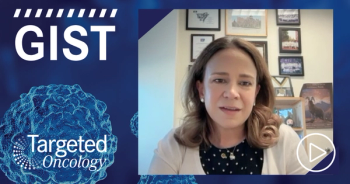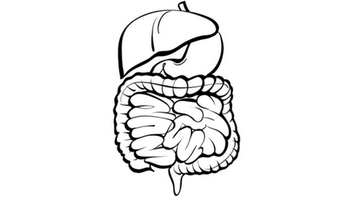
Future Directions of Gastrointestinal Stomal Tumors
Neeta Somaiah, MD: With the approval of 2 new drugs in 2020 for GIST [gastrointestinal stromal tumor], I think there is still a lot of room for improvement. A couple of avenues of improvement are to try to see if with increasing efficacy we can improve the toxicity profile for patients, especially once they switch from imatinib to second- and third-line therapies. With that there was an ongoing phase 3 study looking at ripretinib versus sunitinib to see how it would compare, in terms of efficacy and safety, to sunitinib.
The other big unmet need for GIST, and we hope there is more research done here, is for those patients with wild-type GIST, such as the patient we discussed. Even though we can cycle them through all the available lines of therapy, these patients’ responses to these TKIs [tyrosine kinase inhibitors] tend to be less compared to patients with KIT or some PDGFR mutations.
There are some ongoing studies. There was one with Temodar for patients with wild-type or SDH-mutated GIST, and we hope there will be more studies that will target that population as well.
The other biggest thing when you look at GIST progression is development of resistance. How can we tackle that, when patients respond so well to frontline therapies? Can we decrease the emergence of these resistant clones and help patients have a better outcome without having to cycle through so many drugs? For that patient, there are trials ongoing where patients have received a combination of imatinib with another drug. There was a MEK inhibitor, binimetinib, plus imatinib study, that was presented at ASCO 2020 [American Society of Clinical Oncology annual meeting]. These are early studies, and we’ll need more testing because though it looks promising in the single arm of combining imatinib with binimetinib, only a randomized study will show whether the efficacy improvement is more compared to imatinib alone, and does that justify the increased toxicity that you would see with a combination?
There are other things that are ongoing where you cycle drugs. There was a study of sunitinib alternating with regorafenib. Though you might be able to suppress different clones of resistance, there were challenges associated with such a treatment. Combining both the TKIs does lead to increased toxicity.
The other study that is available is a phase 3 study of crenolanib, which is also specific to the PDGFR D842V population. This study was ongoing even before avapritinib got approved, but now it probably will be used only after the treatment with avapritinib for patients with a subset of that resistant mutation.
With immunotherapy, there was initially a lot of interest in looking at checkpoint inhibitors in combination with the TKIs or alone. There still needs to be a lot of research done in that area because there are some case reports and some trials showing encouraging responses, but other trials are showing no response in patients with GIST. We still need to research that more.
This is an exciting year for the treatment of patients with GIST, with the approval of 2 new drugs. Avapritinib was approved for patients with exon 18 PDGFR-mutated GIST, which is a small subset, but these patients have been previously resistant to other TKIs, and the approval of ripretinib for patients in fourth-line GIST who have progressed, or were intolerant to imatinib, sunitinib, and regorafenib in the previous lines.
It’s important to recognize the availability of these drugs so that patients with GIST can have access to these agents that can have a significant impact on their survival.
Transcript edited for clarity.
Case:
A 68-Year-Old Man With Gastrointestinal Stromal Tumor
Initial presentation
- A 68-year-old man complains of a 4-month history of decreased appetite, vague abdominal discomfort and a sensation of fullness
- PMH: DM, medically controlled; colonoscopy at age 50 was unremarkable; no family history of cancer
- PE: abdominal pain on deep palpation; otherwise unremarkable
Clinical workup
- Labs: Hb 10.5 g/dL, plt 105 x 109/L; other lab values WNL
- Endoscopy: showeda submucosal ~6 cm mass with ulceration
- EUS: irregular borders on extraluminal surfaces with marginal halo and hyperechogenic spots
- FNA biopsy: mitotic activity showed >5 mitoses/50 HPFs
- Mutational testing: WT-GIST
- Abdominal/pelvic CT confirmed a 6.2 cm lesion with indistinct margins in the body of the stomach
- MRI showed 3 small hepatic lesions consistent with metastases
- Stage IV; ECOG 0
Treatment
- He was started on imatinib 400 mg PO qDay, continued for 24 months until he complained of increased abdominal pain and an additional 8-lb weight loss
- ECOG 1; Imatinib was discontinued
- Treatment initiated with sunitinib 50 mg PO qDay for 4 weeks, with a 2-week drug-free interval
- Treatment was well tolerated for 3 cycles when he developed nausea and vomiting; dose reduced to 25 mg PO qDay without resolution of AEs; sunitinib was discontinued
- Regorafenib 160 mg (four 40 mg tablets) PO qDay for the first 21 days of each 28-day cycle was started, poorly tolerated
- Repeat lab work showed: Hb 8.9, AST 65 IU/I; regorafenib was discontinued
- The patient was started on ripretinib 150 mg PO qDay



















